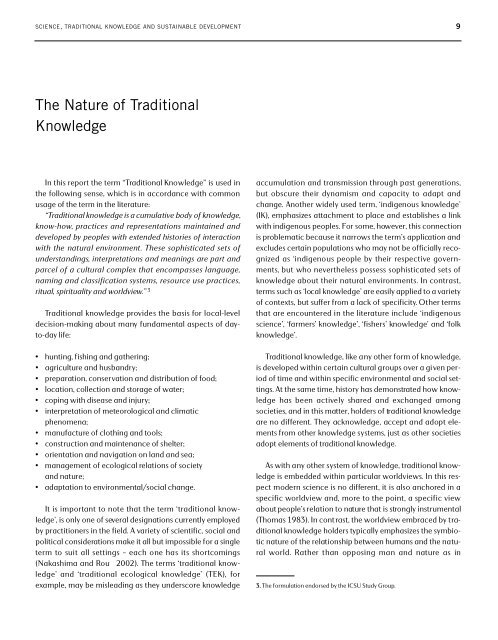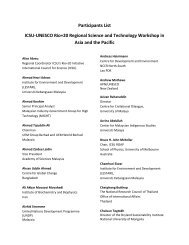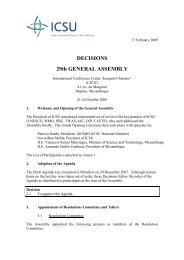Science, Traditional Knowledge and Sustainable Development
Science, Traditional Knowledge and Sustainable Development
Science, Traditional Knowledge and Sustainable Development
Create successful ePaper yourself
Turn your PDF publications into a flip-book with our unique Google optimized e-Paper software.
S C I E N C E, T R A D I T I O N A L K N O W L E D G E A N D S U S TA I N A B L E D E V E L O P M E N T 9<br />
The Nature of <strong>Traditional</strong><br />
<strong>Knowledge</strong><br />
In this report the term “<strong>Traditional</strong> <strong>Knowledge</strong>” is used in<br />
the fol l owing sense, which is in acco rd an ce with co m m o n<br />
usage of the term in the literature:<br />
“<strong>Traditional</strong> knowledge is a cumulative body of knowledge,<br />
k n ow - h ow, pra c ti ces <strong>and</strong> re p res e n tations mai n tai n ed an d<br />
d ev el o ped by peo pl es with exte n d ed histo r i es of inte ra c ti o n<br />
w i th the natural envi ronment. These soph i s ti cated sets of<br />
un d e rs tan d i n g s, inte r p re tations <strong>and</strong> meanings are part an d<br />
parcel of a cu l tural co m plex th at enco m pas s es lan g u a g e ,<br />
n aming <strong>and</strong> clas s i fi cation sy s te m s, res o urce use pra c ti ces,<br />
ritual, spirituality <strong>and</strong> worldview.” 3<br />
Tra d i tional knowledge prov i d es the basis for loca l - l eve l<br />
decision-making abo ut many fun d am e n tal as pects of day -<br />
to-day life:<br />
• hunting, fishing <strong>and</strong> gathering;<br />
• agriculture <strong>and</strong> husb<strong>and</strong>ry;<br />
• preparation, conservation <strong>and</strong> distribution of food;<br />
• location, collection <strong>and</strong> storage of water;<br />
• coping with disease <strong>and</strong> injury;<br />
• interpretation of meteorological <strong>and</strong> climatic<br />
phenomena;<br />
• manufacture of clothing <strong>and</strong> tools;<br />
• construction <strong>and</strong> maintenance of shelter;<br />
• orientation <strong>and</strong> navigation on l<strong>and</strong> <strong>and</strong> sea;<br />
• management of ecological relations of society<br />
<strong>and</strong> nature;<br />
• adaptation to environmental/social change.<br />
It is impo r tant to note th at the term ‘tra d i tional knowledge’,<br />
is only one of several designations currently employed<br />
by practitioners in the field. A variety of scientific, social <strong>and</strong><br />
political considerations make it all but impossible for a single<br />
term to suit all settings – each one has its sh o r tco m i n g s<br />
( Na kashima <strong>and</strong> Roué 2002). The terms ‘tra d i tional knowledge’<br />
<strong>and</strong> ‘tra d i tional ecol og i cal knowledge’ (TEK), fo r<br />
example, may be misleading as they underscore knowledge<br />
a ccum u l ation <strong>and</strong> transmission th rough past generati o n s,<br />
b ut ob s cure their dy n amism <strong>and</strong> ca pa c i ty to adapt an d<br />
c h ange. Another widely used term, ‘indigenous knowl e d g e ’<br />
(IK), emph as i zes attachment to pl a ce <strong>and</strong> es ta bl i sh es a link<br />
with indigenous peoples. For some, however, this connection<br />
is problematic because it narrows the term’s application <strong>and</strong><br />
excludes certain populations who may not be officially recogn<br />
i zed as ‘indigenous pe o ple by their res pe c tive gove r nm<br />
e n t s, but who neve r th e l ess po s s ess soph i s ti cated sets of<br />
k n owledge abo ut their natural env i ronments. In co n tras t,<br />
terms such as ‘local knowledge’ are easily applied to a variety<br />
of contexts, but suffer from a lack of specificity. Other terms<br />
th at are enco un te red in the lite rature include ‘indigenous<br />
s c i e n ce’, ‘far m e rs’ knowledge’, ‘fi sh e rs’ knowledge’ <strong>and</strong> ‘fol k<br />
knowledge’.<br />
<strong>Traditional</strong> knowledge, like any other form of knowledge,<br />
is developed within certain cultural groups over a given period<br />
of time <strong>and</strong> within specific environmental <strong>and</strong> social settings.<br />
At the same time, history has demonstrated how knowledge<br />
has been actively sh ared <strong>and</strong> exc h anged am o n g<br />
societies, <strong>and</strong> in this matter, holders of traditional knowledge<br />
are no diffe rent. They acknowledge, accept <strong>and</strong> adopt elements<br />
from other knowledge systems, just as other societies<br />
adopt elements of traditional knowledge.<br />
As with any other system of knowledge, traditional knowledge<br />
is embedded within particular worldviews. In this respect<br />
modern science is no diffe re n t, it is also an c h o red in a<br />
s pe c i fic wo r l dv i ew an d, more to the po i n t, a spe c i fic view<br />
about people’s relation to nature that is strongly instrumental<br />
(Thomas 1983). In contrast, the worldview embraced by traditional<br />
knowledge holders typically emphasizes the symbiotic<br />
nature of the relationship between humans <strong>and</strong> the natural<br />
world. Rather th an opposing man <strong>and</strong> nature as in<br />
3. The formulation endorsed by the ICSU Study Group.




